by Judy Bello, August 5, 2023
I was invited this year, by some friends, to visit Nicaragua on the occasion of the 44th anniversary of the July 19 victory of their revolution against a violent oppressive government controlled by the United States. Not to be outmaneuvered by an indigenous people, the United States continued the war for another decade, arming and funding terrorist ‘Contra’ terrorists, maintaining a non-stop terrorist war against the people of Nicaragua, even mining the harbors to block trade, a crime which they were convicted of in the International Court of Justice. Like so many states casting off colonial rulers, the Nicaraguans really believed in justice as the foundation of peace, internally and through international law. The ICJ demanded the U.S. pay reparations to Nicaragua for this, but they ignored the judgement and persevered with their terrorist war against the people of Nicaragua and their revolutionary government.
Today, under the FSLN Government of Daniel Ortega, the people’s resources are much expanded, though many still live in poverty. A growing network of roads unites a people where women have equal rights and children go to school. They have the basic amenities of education, medical care, electricity and clean water for drinking and bathing.
Apparently, even now, the powers that be are not anxious to see a lot of travelers heading to Nicaragua, so the flight itineraries were neither convenient nor cheap. My initial flight plan would have me leave my home in Upstate New York at 8 am, and arrive in Nicaragua around 10 pm, about 14 hours. A storm in Washington DC delayed the central flight so long that I had to spend the night in Panama City, bringing my time in transit to closer to 26 hours.
Because of this delay, I missed the initial excursion I had planned, to travel by car to the Caribbean coast and spend a few days looking at recent projects that were bringing rewards to the indigenous people who live there. Instead, I spent a my first few days at the ATC school of AgroEcology, a project of the Friends of the ATC, Friends of the Asociación de Trabajadores Campenaros, or, the Association of Rural Workers. According to GrassRootsOnline, “The ATC operates a Central American Training Center (Francisco Morazán Regional Training Center) and trains community leaders from across Central America in agroecological farming as well as community organizing, advocacy and food sovereignty. The center also deploys trainers to other countries in the region for on-the-ground training.” This “Central American Training Center” is the school where I stayed.
There were a number of young people there, both Nicaraguan and International. It was a pleasure to spend time with them. My roommate was another older woman, she was born in Latin America, raised in the US, and has lived in Nicaragua for more than 20 years. She was a veritable encyclopedia of events from Nicaraguan history which she happily recited for the young students. The school is in a beautiful area, with rooms at the back and red tiled halls without walls leading to a broad white tiled patio frequented by young people with laptop computers, and a short path to a kitchen and dining area, which was also mostly without walls. The food was rice and red beans, plantain prepared in a variety of ways, with cooked vegetables and/or meat and some fresh salad. There was a well used coffee pot in the corner with sugar, but no milk.
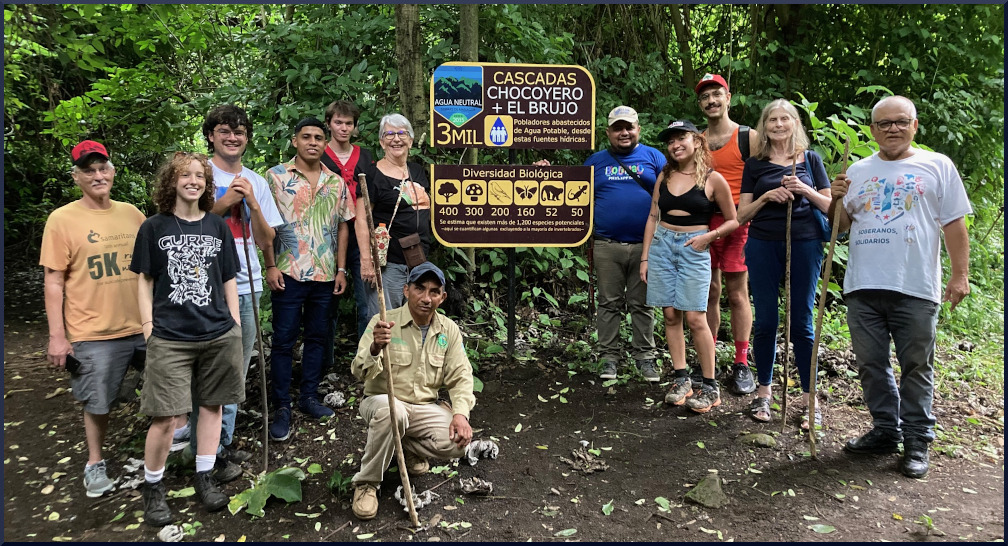
I had many interesting conversations at the school, with these idealistic young people motivated to do some good in the world. The weather was unstable with afternoon deluges, but though the pace of life at the school was slow and seemingly unplanned, we did have some interesting excursions. We traveled deep into a nature preserve over bad roads, partially destroyed by the daily downpours. Local rangers took us on a 30 minute hike, naming local flora along the way, to see a dramatic high waterfall. The basin at the foot of the waterfall was connected by pipes to a local city where it provided the water supply.
The following day there was a small market and dancing near the gate of the school. I had twisted my ankle, so I noticed that among the produce, coffee, t-shirts and crafts, there was a table selling herbal ointments. Later, I spoke to Edwin who sold me a salve for my ankle. It turns out that the herbalist is a doctor versed in many forms of treatment. He had studied in Cuba, and had studied acupuncture with Japanese teachers. When he mentioned this people around me voiced their appreciation for acupuncture and other local medical practices. Unfortunately, at that moment my bags were on a bus, prepared to leave the school and move to the hotel where the larger delegation was staying. He said, well, in any case, his best advice to me would be to sit or lie around for a couple days with the foot elevated. Of course, that was not going to happen, not immediately, in any case.
Later we went to visit a farm where pitahaya (we call it “dragon fruit” in the U.S.) and pineapple are grown. The farm uses organic methods, learned from a company brought in by the Ortega government to teach the farmers cheaper methods of growing crops. What they learned was the nuts and bolts of organic farming, which is also healthier than growing GMO crops for the global market. The owners were an extended family, and son of the owner eventually studied organic farming in college, including how to create organic fertilizer and pest control products. These methods were taught as self sustaining methodologies to save money, but of course they also remove toxins from the environment. He was now busy sharing his knowledge with other Nicaraguan farmers.
One thing is clear. Although the people of Nicaragua now have access to education and medical care; although the government is slowly building infrastructure to provide a source of clean water, electricity, roads and transportation; the vast majority of Nicaraguans remain poor. But thanks to the current government they have nourishing food and the means to live reasonably comfortably. They have widespread educational resources that will uplift the next generation. But today they are poor because of U.S. sanctions, unilateral coercive measures. And the upcoming U.S. sanctions will increasingly undermine the government’s ability to build civil infrastructure.
But to follow my trip to the next step….
I then went to stay a hotel in Managua with the larger delegation with included groups from all over the world. We did some sight seeing and shopping in Managua, swam in the pools and indulged in the local rum. There are large open air markets in Managua where you can buy pretty much anything you may want or need. Shoemakers, sat at their sewing machines near the door where we entered, while traditional embroidered dresses and shirts, hand tooled leather goods, carved wooden ornaments and ceramic pots lined the aisles. And the food market included a large butcher market and a sweet smelling herb store among row upon row of fresh vegetables. There is liquor and junk food in every convenience store, but the open air market is where the real goods are.
Moving on, the purpose of our visit was to attend the yearly celebration of their liberation, a festive affair with thousands in attendance, that took place in the central plaza in Managua and was broadcast throughout Nicaragua on TV and far and wide. The delegations were all bused there together and seated early. I was lucky, my group was front and center, my seat only a few rows from the stage, behind a group of TV cameras. As we were seated, we could see the youth seated behind and above us. A sea of people came to sit in lines of chairs with crisp white covers and blue ribbons.
The young people began chanting, “Daniel, Daniel, Daniel…” whenever it seemed Ortega’s arrival was imminent. When Daniel and Rosario, his wife and vice president, finally arrived’ the crowd cheered wildly and stood, before I could even see them. Daniel Ortega and Rosario Murillo arrived with a contingent of diplomats and international guests, greeting them warmly with hugs as they came to the staging area. When all were seated, Rosario Murillo spoke briefly, a message of love and peace, then a band on stage with 6 singers began to play. The band was good and the singers were great. All told, they played for more than 2 hours and the crowd was loving it! Daniel and Rosario stood behind a table at the front, swaying to the music and singing along at times.
These were songs of the revolution. I was thinking that the music was good enough that I would go just for the concert. But it was more than that. The crowed stood and swayed; people danced in front of their chairs, sang along and waved their fists in the air. “El pueblo unido jamás será vencido!” “The People United Will Never Be Defeated“. And so many more…..
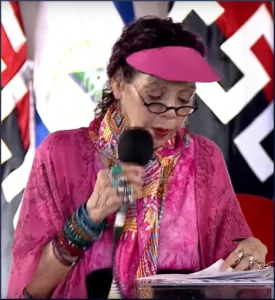 The concert was punctuated by short speeches from Rosario Murillo who first spoke of peace and love, christian values and unity, and who later introduced the international guests who lined the stage. She read a poem by Thomas Sankara, an African revolutionary from Burkina Faso who had come to power in the early 80s, around the same time the FSLN came to power in Nicaragua. Thomas Sankara had visited Nicaragua and befriended Daniel Ortega when he first became President of Nicaragua. They were revolutionaries of the same time and resonated with the power of the day.
The concert was punctuated by short speeches from Rosario Murillo who first spoke of peace and love, christian values and unity, and who later introduced the international guests who lined the stage. She read a poem by Thomas Sankara, an African revolutionary from Burkina Faso who had come to power in the early 80s, around the same time the FSLN came to power in Nicaragua. Thomas Sankara had visited Nicaragua and befriended Daniel Ortega when he first became President of Nicaragua. They were revolutionaries of the same time and resonated with the power of the day.
Thomas Sankara
Thomas Sankara governed Burkina Faso for 4 years before he was assassinated. Like Daniel Ortega, he worked to make his country self sustaining and prioritized literacy, healthcare and social justice, and built civilian infrastructure. It is not surprising that he formed a friendship with the newly vested Nicaraguan leadership and sympathized with their ongoing struggle for sovereignty against covert U.S. warfare.
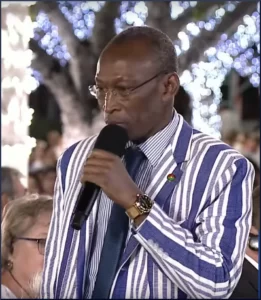 The honored guest of this evening’s event was the current Prime Minister of Burkina Faso, Apollinaire Joachimson Kyélem De Tambèla, who then spoke of how Nicaragua’s resistance and successful revolution was an inspiration to the youth in Burkina Faso who wished for freedom ; how the students admired Augusto Sandino and Daniel Ortega, and followed the Nicaraguan revolution with hope and inspiration. He says that despite the physical distance, in 1986, Daniel Ortega visited Burkina Faso and Thomas Sankara visited Nicaragua, saying that this exchange reflects is their true relationship. This focus may be related to the recent wave of anti-colonial coups and resistance movements across the Sahel.
The honored guest of this evening’s event was the current Prime Minister of Burkina Faso, Apollinaire Joachimson Kyélem De Tambèla, who then spoke of how Nicaragua’s resistance and successful revolution was an inspiration to the youth in Burkina Faso who wished for freedom ; how the students admired Augusto Sandino and Daniel Ortega, and followed the Nicaraguan revolution with hope and inspiration. He says that despite the physical distance, in 1986, Daniel Ortega visited Burkina Faso and Thomas Sankara visited Nicaragua, saying that this exchange reflects is their true relationship. This focus may be related to the recent wave of anti-colonial coups and resistance movements across the Sahel.
Daniel’s Speech
The celebration had gone on so long that I thought at this point that Daniel Ortega might actually not speak. But, he finally took the mic and began his talk. He spoke for an hour and a half. Not being a Spanish language speaker, I occupied myself observing his tone and his body language. It seemed a little confusing to me. He spoke softly, and his voice would often fall when he had a strong point to make. He would lean forward, lower the mic and look directly at the audience, as his tone was lowered. I wondered if he might not be feeling well. People applauded intermittently, but of course, I did not know what they were applauding.
Later, when I was able to read a translation of his words, I understood what he was doing. He was telling stories, and he used the tone and gestures of a good story teller, lowering his voice at critical moments to command your attention. A friend who speaks some Spanish said that he found Daniel difficult to understand because he spoke the language of the peasants and workers. This may also be true, as story telling is a way of preserving information for those who don’t write books. In Daniel’s case, he is speaking to an audience of young people, most of whom have did not experience the revolution and who do not remember the time before it.
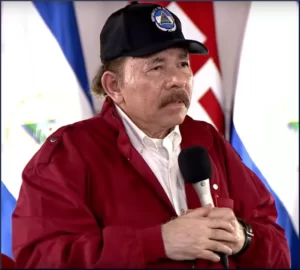
So, Daniel Ortega is a story teller, and his long speech comprised a series of little stories to inform his audience. He started with a tribute to his old friend Thomas Sankara. He spoke of the time they initially governed their nations, and then of another great African leader, Muamar Gaddhafi, of his assassination and the dismemberment of Libya by a NATO force under the leadership of the U.S. President Obama, the complete devastation of the country with the highest standard of living in Africa.
Here he paused to make a clarification of language that I found quite generous, but also very useful. He said that by “Yanks” or “Yankees” he referred to the colonialist U.S. government. However, the people of “North America” are another story. They are people like us (Nicaraguans), who wish to live in peace, and we have many friends among them. So what is useful here, is that I have often considered what would be the best way to refer to the people of the U.S. who we constantly refer to as “Americans” as if we were the only people on the continent. U.S.ians is awkward and silly. But “North Americans”, clearly refers to the people of the U.S. and Canada. That works.
Daniel briefly side tracked to the story of Roberto Clemente, a Puerto Rican baseball player who died in a tragic plane crash while bringing aide to Nicaragua. He expressed solidarity with Puerto Rico, and from there transitioned onto the subject of sovereignty, a major issue for Puerto Rico. Then he related the history of colonial oppression of Nicaragua, and Resistance, beginning with the arrival of the Conquistadors.
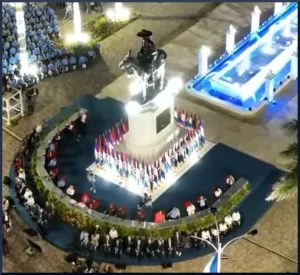
Speaking to those young people in the audience who were not yet born in the 70s and 80s when the FSLN was fighting for Nicaraguan independence and a place at the table for the poor and indigenous peoples of the country, Daniel began by telling them about the Spanish who came to steal their gold, and then moves from one story to the next, of invaders and heroic resistance. He pauses to relate a metaphor of sovereignty, a story about a bull and an ox, a story about slavery vs. freedom. What is sovereignty? Now he moves on to the story of Sandino’s fight against the Yankee occupiers, leading to his death and Somoza’s rise to power. This is one story and many, with hero after hero facing villain after villain. Sandino’s wife, Blanca Stella Arauz, Rigoberto López Pérez who ultimately assassinated Somoza, Carlos Fonseca, and others, including Roberto Clemente.
One story leads to the next. Now he talks about his early years in power, about the case the brought before the ICJ in 1986, when they accused the United States for mining the harbors among other acts of violence and the international struggle over the ultimate location of what is now the Panama Canal. This last is important because there is once again talk of building a canal through Nicaragua to connect the Atlantic and Pacific Oceans. He spoke of old and ongoing legal battles with Colombia over territorial rights in the Caribbean. But in the end he said, “of course, we do support the Colombian Peace Process” while it is clear he would like the new Colombian President Petro to know that although Nicaragua lost the latest legal battle, he wants an agreement that Nicaragua can keep what they won in the initial one.
Finally, Daniel turns to the most current affairs to speak of the recent meeting of CELAC (Community of Latin American and Caribbean States) with the European Union. Nicaragua sent representatives despite a constant barrage of hostility from the EU Parliament. He says that they disagreed with the Europeans on important issues, and that though the Europeans pressured them heavily, they did not retreat. Indeed they won some and lost some in the tug-a-war over the contents of a final statement.
The Europeans wanted to bring the Ukrainian President into the meeting, but CELAC members resisted and finally, Zelenski was not invited. The Europeans wanted to make a statement blaming Russia for the war in Ukraine, which is is not a point of agreement, but more to the point, it is not the business of the day. CELAC members wanted to note that Europe had promised billions to to them to deal with environmental issues, but never sent a penny. They spent a fortune on the war in Ukraine while they couldn’t meet their obligations related to peace, to fighting poverty and restoring the environment.
The issue of the U.S. sending cluster munitions to Ukraine was raised by members of CELAC, by the Europeans simply brushed aside the point. Nicaragua also raised the issue that the United States had never paid the reparations to Nicaragua that were demanded by the ICJ in 1986. This point was also rejected. Venezuela and Nicaragua raised the issue of the blockade of Cuba, also rejected. Finally the Europeans held a press conference and stated that ‘Agreement’ had been reached. However, Nicaragua disagreed. Daniel pointed out that this is not way consensus is reached.
The Europeans made more promises they are unlikely to fulfill. Given the large sums of money going into the Ukraine war, and the difficulties of the European economies, Nicaragua does not see CELAC has much to gain from them at present. Nicaragua didn’t sign the agreement because they did not agree. He went on to say that some countries are forming bilateral agreements with the Europeans, and he wishes them well because he doesn’t wish anyone to do badly.
In closing, Daniel Ortega made reference to Benjamin Linder and the need for “Solidarity of the Peoples even in the most difficult times“.
Why all this? Why all these stories? So the people will be educated as to what their place is in the world, what their history is and what are the current interests of their nation. I thought the speech was an important part of Daniel Ortega’s movement to include all the people in the operations of his country. They can see whether there are hospitals and roads being built; they know whether they have indoor plumbing, electricity and internet; whether their diet is adequate. But here he is telling them his vision of the foundations of their society and the way it rests in the world.
Transcript of the speeches at the Celebration of the 44th Anniversary of the July 19 Liberation
A few days prior to the celebration, I participated in a conversation about “what it takes to create a revolution“, or what it takes to “mobilize” people for revolution and deep political change. I think this is interesting to North Americans because, as frustrated as we are with our governance, we are, as a people, unimaginably far from “Revolution.” In any case, one of the delegates from the U.S., a college professor from the Berkeley, raised the idea that you need rituals to bring people together. I had not thought about it previously, but it seemed a powerful idea. But I added my sense that “you also need a charismatic leader“.
My fellow delegate replied that the latter was irrelevant because there are many young people ready to be groomed. I disagree with this idea, as I don’t think you can groom a true “charismatic leader” as I envision such an individual. But our description was clearly incomplete as I can fulfill its terms by pointing to some very disturbing scenarios. For instance, I thought of the Nazis filmed by a friend, marching through Odessa with flaming torches chanting “Death to Russians” on the May 2 anniversary of the massacre at the House of Trade Unions there. A potent ritual, but not a road to good governance. And, speaking of Nazis, there is Hitler, a charismatic leader, but not one I would wish on the world.
So anyway, the discussion was not resolved in my mind. But I thought, after the events of July 19, that you need a leader with the spirit of the people, someone who supports growth and life in society. This may be the reason why can’t “groom” the “charismatic leader” posited for the discussion, for a popular revolution. However, I think we must “groom” the society with information and the possibility of a better worId.
Meanwhile, I recently attended a conference in Lebanon, a small country like Nicaragua, where Hezbollah, an organization of young men had recently driven a brutal occupation force from their land. Like Nicaragua, the threat continues to hover over Lebanon. These countries remain under serious U.S. sanctions with North American a European powers hovering like vultures at the gate. Israel constantly threatens to re-invade Lebanon, while the United States continues to support coup plans against the elected Nicaraguan government.
In both countries, the ritual involves a celebration of “liberation“, a very personal tribute to those who lead the initiative and those who died to make it happen, and finally a celebration of their own culture and ongoing readiness to continue resistance.
As I left the 44-19 Celebration, we delegates were waiting to cross the road, looking for our companions and our buses, I saw the young people from the tiered seats at the back of the stadium. A mixture of grammar school children and teenagers, they formed a human chain, hand to hand, as they wound their way through the crowd and across the street.
Judy Bello is a story teller, and a member of the UNAC AC. She is also on the board of Syria Support Movement and the active committee of Ban Killer Drones. Judy hosts and moderates websites for both organizations and several more.
